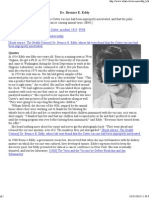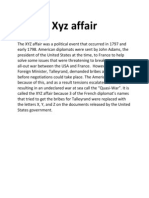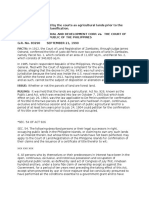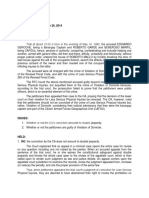Disraeli
Disraeli
Uploaded by
mary engCopyright:
Available Formats
Disraeli
Disraeli
Uploaded by
mary engOriginal Description:
Copyright
Available Formats
Share this document
Did you find this document useful?
Is this content inappropriate?
Copyright:
Available Formats
Disraeli
Disraeli
Uploaded by
mary engCopyright:
Available Formats
BENJ AMI N DI S RAELI
DISRAELI
GLENN HOROWI TZ BOOKS ELLER
NEW YORK CI TY
MMI V
ts Patrick McGrath xn Glenn Horowitz
c o r s r i o u : o o o i r u o r o wi z t o o x s r i i r r, i c .
o i r u o r o wi z t o o x s r i i r r
. , : r x s - u s r r r r w s o r x c i s . o o : .
: . : - , : - - , , , rx x : : . : - , : - - , , :
I LLUS TRATI ONS
Passport of Benjamin Disraeli [recto] :
Autographletter to the Morning Chronicle, ca.July.: c-
Passport of Benjamin Disraeli [verso] ,,
( , )
T
HE ARCHIVE covers every aspect of Disraelis mature life, beginning
with the manuscripts for the Home Letters, a series of dispatches to family
members from stops on his rst tour of the continent in .,o and .,.
(bound with Ralph Disraelis corrected proofs for the posthumous rst edition).
Those exuberant communications contrast sharply with the chaos and despera-
tion of the thirty-two letters to his tailor cum banker Richard Culverwell, com-
posed at the crucial juncture following the success of Vivian Grey, his rst novel,
but prior to his inaugural election to Parliament in .,-. In both series we witness
the transformation of a tumultuous boy-man into a sober Parliamentarian; we see
Disraeli abandon his mistresses and enter into marriage (in the letter he sent his
solicitor about his pre-nuptial agreement as well as the one he dispatched to his
sister Sarah about preparations for the wedding ceremony); and in the proud,
playful accounts to Sarah detailing his experiences in the House of Commons we
calibrate his growing condence. In all, there are almost ,o letters from the early
Parliamentary years; an equal number covering the period from the .c- Reform
Bill until Disraelis defeat in the General Election of .o; :- letters on tactics and
intrigues to his Parliamentary whip, William Hart-Dyke; and, nally, the massive
collection of letters and manuscripts to Algernon Turnor, his Second Private Sec-
retary during his last administration from .- to .o.
The Turnor material an archive within the Archive is an exceptional
resource for understanding the Prime Ministerial Disraeli. Rich in letters on gov-
ernance, it has telegrams in Disraelis holograph to the Queen and other Euro-
pean heads of state, some in cipher, as well as a crucial Cabinet memorandum
( - )
about the crises in Afghanistan and India. The lengthy correspondence to Turnor
and Hart-Dyke, along with those to female intimates like Lady Chesham and
Lady Forester, also afford glimpses into Disraelis private emotions as he balanced
the privileges of power. Each contains moving expressions of frustration about
failing health (he commenced his second term as Prime Minister at -o), exasperat-
ed comments about the press and the obstinacy of public opinion, and humorous
jibes at almost everyone he encountered. Throughout, the Archive is saturated by
the legendary wit with which Disraeli entertained allies and skewered enemies for
decades.
This is, we believe, the most extensive Disraeli collection offered in decades,
and it constitutes the largest holding of Disraeliana outside of British institutions.
What follows is a Baedeker to the Archive, arranged, roughly, in accord with the
chronology of Disraelis life.
The Grand Tour and the Home Letters
Disraeli was already notorious and more than a little disreputable when this
collection picks up his story in the late .:os, soon after the publication of Vivian
Grey. The novels succs de scandale generated a backlash when the public learned
that the author was not the experienced man of affairs the narrator purported to
be, but a twenty-something on the make, whose sole achievement was a pile of
debt from stock market speculations. Sensitive to his sinking fortunes, both eco-
nomic and social, Disraeli tried to bolster his position with self-laudatory articles
and pamphlets, but not even his burgeoning literary skills could transform imsy
ventures like the Anglo-Mexican Mining Association into viable enterprises. A
stab at newspaper publishing proved equally disastrous, compounding his debts.
He needed to get away.
In late .:, Disraeli may have suffered a nervous breakdown or, more likely,
played host to one of those mysterious psycho-physical ailments that seemed
rampant in nineteenth-century life and letters: one doctor gave him the preposter-
ous diagnosis of chronic inammation of the membranes of the brain, and rec-
ommended rest and a change of climate. Disraeli himself would describe his state
( )
t r j x x i n i s r x r i i
as one of those tremendous disorganizations which happen to all men at some
period of their lives, and which are perhaps equally necessary for the formation of
both body and constitution. Whether I shall ever do anything which may mark me
out from the crowd, I know not. I am one of those to whom moderate reputation
can give no pleasure, and who in all probability am incapable of achieving a great
one. Isaac DIsraeli characterized his sons malady as one of those perplexing
cases which remain uncertain and obscure, till they are nally got rid of. Mean-
while patience and resignation must be his lot two drugs in human life, bitter of
digestion, in an ardent and excitable mind (Monypenny, i, ..c).
With nancial aid from his father and proceeds from the sale of a hastily
composed novel, The Young Duke, Disraeli, along with his sister Sarahs anc
William Meredith, set off for the east in the spring of .,o. Almost immediate-
ly he began sending letters to his father, his brother Ralph, and his sister the
correspondence that makes up the Home Letters. They have, as biographer
Lord Blake put it, a zest, a vitality, and a self-serving egotism which seldom fail
to fascinate. Whether writing about ponderous British ofcials, exotic foreign
potentates, or memorable servants, Disraeli was always vivid, witty, and sharp.
The Judge-Advocate-General in Gibraltar, for example, was a true lawyer, ever
illustrating the obvious, explaining the evident, and expatiating the common-
place. The Turkish Grand Vizier was an approved warrior, a consummate
politician, unrivalled as a dissembler in a country where dissimulation is the prin-
cipal portion of their moral culture. Disraelis audience with the pillar of the
Turkish empire was a heady experience, as was his conversation with an Austri-
an diplomat who said with the self-possession of a morning call that the Grand
Vizier has destroyed in the course of the last three months upwards of four
thousand of my acquaintance. His route took him to Gibraltar, Spain, Malta,
Albania, Greece, Constantinople, Jerusalem and Egypt, and his letters home
demonstrate profound powers of observation. The membranes of his brain had
obviously healed.
On July ., .,o Disraeli reports on news of King George IIIs death, lament-
ing that the obligatory period of black-clad mourning would be the destruction
( , )
u r o r x n o u r x n u r u o x r i r r r s
You might also like
- Joint Pre-Trial MemorandumDocument32 pagesJoint Pre-Trial MemorandumWilliam F. ZachmannNo ratings yet
- DR David Martin Liberty and Justice in An Era of PandemicsDocument10 pagesDR David Martin Liberty and Justice in An Era of PandemicsadosigalNo ratings yet
- Ardency: A Chronicle of The Amistad RebelsDocument34 pagesArdency: A Chronicle of The Amistad RebelsAnonymous FHCJucNo ratings yet
- "Where Are The Movies Moving" Aldous HuxleyDocument2 pages"Where Are The Movies Moving" Aldous HuxleyJohannes de SilentioNo ratings yet
- Gene Tatum USDistrictCourtCase201213334 20130405Document5 pagesGene Tatum USDistrictCourtCase201213334 20130405Gordon DuffNo ratings yet
- Basson, BK Appeal Brief New (2)Document22 pagesBasson, BK Appeal Brief New (2)Ron Houchins100% (1)
- Who Are These PeopleDocument12 pagesWho Are These PeopleRichardNo ratings yet
- Intersubjectivity and Phenomenology of The Other: Merleau Ponty's ContributionDocument25 pagesIntersubjectivity and Phenomenology of The Other: Merleau Ponty's ContributionTalia TijeroNo ratings yet
- The Great Poisoning of America Begins October 2009Document4 pagesThe Great Poisoning of America Begins October 2009wisemen2No ratings yet
- 2019 MCM (Final) (20190108)Document772 pages2019 MCM (Final) (20190108)Shain E. ThomasNo ratings yet
- Laws of SuccessDocument2 pagesLaws of SuccessReynaldo MarinNo ratings yet
- The Jews' Sayanim/SpiesDocument3 pagesThe Jews' Sayanim/Spiesapi-281415263No ratings yet
- McVay, 66 Questions & Answers About The HolocaustDocument79 pagesMcVay, 66 Questions & Answers About The HolocaustLeonardo Shark-Ind PedronNo ratings yet
- Bible Standard February 1890Document16 pagesBible Standard February 1890Anonymous hQK4kSPNo ratings yet
- Mycoplasma Laboratorium PDFDocument9 pagesMycoplasma Laboratorium PDFragod2No ratings yet
- Dr. Bernice E. Eddy Cutter VaccineDocument1 pageDr. Bernice E. Eddy Cutter VaccineCTSoldierNo ratings yet
- Cabinet :: Mass EffectDocument15 pagesCabinet :: Mass Effectnllano123No ratings yet
- Space Frontier Foundation - Space Frontier Conference XII: SynopsisDocument14 pagesSpace Frontier Foundation - Space Frontier Conference XII: SynopsisSpace Frontier FoundationNo ratings yet
- As History - RussiaDocument56 pagesAs History - Russiaizzy 12No ratings yet
- Memorandum To Benard Berelson 1969-EUGENISME PREUVEDocument1 pageMemorandum To Benard Berelson 1969-EUGENISME PREUVEcruxsacraNo ratings yet
- The Torture and Death of Saint Simon of TrentDocument2 pagesThe Torture and Death of Saint Simon of TrentSolarGeneralNo ratings yet
- Suspension of WorkDocument1 pageSuspension of WorkShahid AkramNo ratings yet
- ADL Report "Attacking" Press TVDocument20 pagesADL Report "Attacking" Press TVGordon DuffNo ratings yet
- Mercator, Gerardus PDFDocument4 pagesMercator, Gerardus PDFcreeshaNo ratings yet
- T3 B5 Analysis 2 of 2 FDR - 1st Pgs of All Reference Material in Folder (For Reference - Fair Use)Document8 pagesT3 B5 Analysis 2 of 2 FDR - 1st Pgs of All Reference Material in Folder (For Reference - Fair Use)9/11 Document Archive100% (6)
- New York's Plum Island Animal Disease Center Accused of Weaponizing Ticks, Spreading LYME DiseaseDocument5 pagesNew York's Plum Island Animal Disease Center Accused of Weaponizing Ticks, Spreading LYME DiseaseHansley Templeton CookNo ratings yet
- Global Urbanization and Protected Areas: Ted TrzynaDocument51 pagesGlobal Urbanization and Protected Areas: Ted TrzynasrichardequipNo ratings yet
- Evidence 2Document5 pagesEvidence 2api-314214682No ratings yet
- Presented by Amardeep BardhanDocument19 pagesPresented by Amardeep BardhanamardeepNo ratings yet
- 2.2 Biochemistry On 1894Document2 pages2.2 Biochemistry On 1894silvina53No ratings yet
- 2003 Trafficking in Persons ReportDocument177 pages2003 Trafficking in Persons ReportU.S. Department of StateNo ratings yet
- Operation Al-Aqsa Storm Friday Talking PointsDocument2 pagesOperation Al-Aqsa Storm Friday Talking PointsSuhaib Patel100% (1)
- Anaconda PlanDocument2 pagesAnaconda Planapi-377801018100% (1)
- Organizing Atlanticism: The Bilderberg Group and The Atlantic Institute, 1952-1963 Valerie AubourgDocument15 pagesOrganizing Atlanticism: The Bilderberg Group and The Atlantic Institute, 1952-1963 Valerie AubourgStratis BournazosNo ratings yet
- The Hemp Trojan HorseDocument2 pagesThe Hemp Trojan HorseMichael Ellis100% (1)
- George Washington's 1789 Thanksgiving Proclamation...Document8 pagesGeorge Washington's 1789 Thanksgiving Proclamation...Federico CerianiNo ratings yet
- Common MycoplasmasDocument14 pagesCommon MycoplasmasChrist Is BackNo ratings yet
- Joy - Why The Future Doesn't Need UsDocument18 pagesJoy - Why The Future Doesn't Need UsAnonymous Pu2x9KVNo ratings yet
- Statism - The Opiate of The ElitesDocument6 pagesStatism - The Opiate of The ElitesJames HenryNo ratings yet
- Follow The Patents It Will Take You To The Money: Dr. David E. Martin WWW - Davidmartin.worldDocument20 pagesFollow The Patents It Will Take You To The Money: Dr. David E. Martin WWW - Davidmartin.worldmartio jonesetti100% (1)
- Operation NorthwoodsDocument6 pagesOperation NorthwoodsdkdeadyNo ratings yet
- Xyz AffairDocument2 pagesXyz AffairSnooplion56100% (1)
- Jewish Declaration of War On Nazi GermanyDocument7 pagesJewish Declaration of War On Nazi GermanySam OvNo ratings yet
- Israel Bipartisan ResolutionDocument4 pagesIsrael Bipartisan ResolutionCami MondeauxNo ratings yet
- Rand Rr2641Document223 pagesRand Rr2641Ankit Kumar JainNo ratings yet
- Operation Stone Garden FactsheetDocument3 pagesOperation Stone Garden FactsheetAntoinette Capasso-BackdahlNo ratings yet
- Patient ProfileDocument5 pagesPatient ProfileMicah Mangwag100% (1)
- Wanta - Black Swan 1-6Document122 pagesWanta - Black Swan 1-6canauzzieNo ratings yet
- Urban Moving Systems and Detained Israelis Www-Whatreallyhappened-Com PDFDocument2 pagesUrban Moving Systems and Detained Israelis Www-Whatreallyhappened-Com PDFWhat Really HappenedNo ratings yet
- Jay Inslee, Islam and A Web of DeceptionDocument37 pagesJay Inslee, Islam and A Web of DeceptionBradley CairnesNo ratings yet
- Democracy RisingDocument28 pagesDemocracy RisingLuca MalaNo ratings yet
- The Facts About AidsDocument5 pagesThe Facts About AidsTAMBAKI EDMONDNo ratings yet
- New Possible Treatments & Old Drugs May Find A New Purpose Fighting The CoronavirusDocument46 pagesNew Possible Treatments & Old Drugs May Find A New Purpose Fighting The CoronavirussylodhiNo ratings yet
- Assyrian GenocideDocument9 pagesAssyrian GenocidebandarsNo ratings yet
- UN Resolution Against IsraelDocument5 pagesUN Resolution Against Israeladams678No ratings yet
- UN "Peacemaking": Drenched in BloodDocument178 pagesUN "Peacemaking": Drenched in BloodGustavBlitz100% (5)
- The Great Temple Deception: Interpreting the Highest Prophecy in HistoryFrom EverandThe Great Temple Deception: Interpreting the Highest Prophecy in HistoryNo ratings yet
- Aliens and Us Are We Prepared Yet?: A Psychological Preparation for the First Alien EncounterFrom EverandAliens and Us Are We Prepared Yet?: A Psychological Preparation for the First Alien EncounterNo ratings yet
- Binder 2001756 RedactedDocument56 pagesBinder 2001756 Redactedmary engNo ratings yet
- Clatsop District Attorney Ron Brown Combined Bar Complaints 12-1-23Document333 pagesClatsop District Attorney Ron Brown Combined Bar Complaints 12-1-23mary engNo ratings yet
- Clatsop District Attorney Ron Brown Combined Bar Complaints 12-1-23Document333 pagesClatsop District Attorney Ron Brown Combined Bar Complaints 12-1-23mary engNo ratings yet
- Cloninger Kasey D DSM CAO 06-26-08 RedactedDocument7 pagesCloninger Kasey D DSM CAO 06-26-08 Redactedmary engNo ratings yet
- Project Veritas Action Fund v. Rollins, Martin v. Rollins, No. 19-1586 (1st Cir. 2020)Document72 pagesProject Veritas Action Fund v. Rollins, Martin v. Rollins, No. 19-1586 (1st Cir. 2020)mary engNo ratings yet
- Brown Ronald 1994 0418 Admonition Letter 93-156 27565-1Document1 pageBrown Ronald 1994 0418 Admonition Letter 93-156 27565-1mary engNo ratings yet
- 2023 0203 Original Inquiry BROWN Reyneke Redacted-1Document58 pages2023 0203 Original Inquiry BROWN Reyneke Redacted-1mary engNo ratings yet
- Wilson Mark J. GC 06-10-10 1000346 Redacted-1Document518 pagesWilson Mark J. GC 06-10-10 1000346 Redacted-1mary engNo ratings yet
- Oregon Defender Crisis 11-2023 McshaneDocument32 pagesOregon Defender Crisis 11-2023 Mcshanemary engNo ratings yet
- Whistleblower Retaliation Clatsop County 23CR23294 Def DocsDocument265 pagesWhistleblower Retaliation Clatsop County 23CR23294 Def Docsmary engNo ratings yet
- Wilson Mark J. GC 06-10-10 1000346 RedactedDocument518 pagesWilson Mark J. GC 06-10-10 1000346 Redactedmary engNo ratings yet
- Motion To Dismiss 23CR23294 Clatsop County v. Mary EngDocument56 pagesMotion To Dismiss 23CR23294 Clatsop County v. Mary Engmary engNo ratings yet
- Project Veritas v. Schmidt Verified Complaint 2020Document18 pagesProject Veritas v. Schmidt Verified Complaint 2020mary engNo ratings yet
- HumanResourceExploitationManual CIA PDFDocument135 pagesHumanResourceExploitationManual CIA PDFLouis CorreaNo ratings yet
- OREGON RULES OF PROFESSIONAL CONDUCT (As Amended Effective March 1, 2022)Document36 pagesOREGON RULES OF PROFESSIONAL CONDUCT (As Amended Effective March 1, 2022)mary engNo ratings yet
- Oregon Public Defense CrisisDocument11 pagesOregon Public Defense Crisismary engNo ratings yet
- Oregon State Bar Professional Liability Fund 2023 Primaryplan Web FinalDocument29 pagesOregon State Bar Professional Liability Fund 2023 Primaryplan Web Finalmary engNo ratings yet
- Initial Discovery 1-50 (1) Osarch Orak Pressing Charges On Mary EngDocument50 pagesInitial Discovery 1-50 (1) Osarch Orak Pressing Charges On Mary Engmary engNo ratings yet
- Veritas v. SchmidtDocument78 pagesVeritas v. Schmidtmary engNo ratings yet
- STEPHEN SINGER, Plaintiff, vs. THE STATE OF OREGON by and Through The PUBLIC DEFENSE SERVICES COMMISSION, Defendant.Document35 pagesSTEPHEN SINGER, Plaintiff, vs. THE STATE OF OREGON by and Through The PUBLIC DEFENSE SERVICES COMMISSION, Defendant.mary engNo ratings yet
- BOLI Re LIfeboat Beacon Discrimination PDFDocument2 pagesBOLI Re LIfeboat Beacon Discrimination PDFmary engNo ratings yet
- Osarch Orak Firearms Arrest - A20154105 - RedactedDocument9 pagesOsarch Orak Firearms Arrest - A20154105 - Redactedmary engNo ratings yet
- Mercy Corps Complaint Final 090722 SignedDocument45 pagesMercy Corps Complaint Final 090722 Signedmary engNo ratings yet
- Lifeboat Services Astoria, OregonDocument1 pageLifeboat Services Astoria, Oregonmary engNo ratings yet
- Final Misconduct Correspondence From Joshua Stellmon On LiFEBoat Homeless Clatsop Astoria OregonDocument1 pageFinal Misconduct Correspondence From Joshua Stellmon On LiFEBoat Homeless Clatsop Astoria Oregonmary engNo ratings yet
- BudgetDocument132 pagesBudgetmary engNo ratings yet
- Alan Kessler Oregon State Bar Complaint Review RequestDocument2 pagesAlan Kessler Oregon State Bar Complaint Review Requestmary engNo ratings yet
- Terry Bean Hush MoneyDocument129 pagesTerry Bean Hush Moneymary eng100% (1)
- Smart Commnications vs. AldecoaDocument27 pagesSmart Commnications vs. Aldecoahlcamero100% (1)
- Sta. Monica vs. CADocument2 pagesSta. Monica vs. CAowen100% (1)
- Doe v. SexSearch - Com Et Al - Document No. 123Document41 pagesDoe v. SexSearch - Com Et Al - Document No. 123Justia.com100% (1)
- First Inaugural AddressDocument8 pagesFirst Inaugural AddressPaulo FilhoNo ratings yet
- Herida vs. F&C PawnshopDocument9 pagesHerida vs. F&C Pawnshopgoannamarie7814No ratings yet
- Domestic Workers and Sub-Decree 190Document39 pagesDomestic Workers and Sub-Decree 190SianLea100% (2)
- Travis Lee Arrest WarrantDocument10 pagesTravis Lee Arrest WarrantCalebNo ratings yet
- Right of Stockholders and Members - 6Document34 pagesRight of Stockholders and Members - 6Rache GutierrezNo ratings yet
- Case Digest 1Document4 pagesCase Digest 1Victor LimNo ratings yet
- Tesla V Tripp - Tesla Emergency Motion PDFDocument12 pagesTesla V Tripp - Tesla Emergency Motion PDFDJ FerrisNo ratings yet
- Why Huntley High School Student Won't Be Charged For Distributing Racist PamphletsDocument13 pagesWhy Huntley High School Student Won't Be Charged For Distributing Racist PamphletsNorthwest HeraldNo ratings yet
- Commercial Law Assignment 2Document7 pagesCommercial Law Assignment 2Francis BandaNo ratings yet
- MPU 1153 - Class ExerciseDocument8 pagesMPU 1153 - Class ExerciseReen Zaza ZareenNo ratings yet
- Advertisement of SchemeDocument3 pagesAdvertisement of SchemeYasirSwatiNo ratings yet
- Canon 17 Case DigestsDocument2 pagesCanon 17 Case DigestsRywelle BravoNo ratings yet
- De Lima Vs Reyes - Case DigestDocument6 pagesDe Lima Vs Reyes - Case DigestOnilyn Molino0% (1)
- Flags in Courtroom PDFDocument67 pagesFlags in Courtroom PDFJohn Kronnick100% (1)
- Santiago v. Guingona, G.R. No. 134577, November 18, 1998.full TextDocument22 pagesSantiago v. Guingona, G.R. No. 134577, November 18, 1998.full TextRyuzaki HidekiNo ratings yet
- Moot Prop 3.Document7 pagesMoot Prop 3.AdityaSharmaNo ratings yet
- UPJOHN v. USDocument3 pagesUPJOHN v. USMargaret SandovalNo ratings yet
- Villareal Vs PeopleDocument4 pagesVillareal Vs PeopleMinerva LopezNo ratings yet
- United States v. Christie Herrera, 4th Cir. (2014)Document4 pagesUnited States v. Christie Herrera, 4th Cir. (2014)Scribd Government DocsNo ratings yet
- Civil Procedure Bar Question 16Document2 pagesCivil Procedure Bar Question 16Ray Allen Dizon100% (1)
- Opic in Yllabus: Athena de Mesa Page 1 of 2 Case # 10Document2 pagesOpic in Yllabus: Athena de Mesa Page 1 of 2 Case # 10Joshua AbadNo ratings yet
- Rachel AlintoffDocument2 pagesRachel AlintoffmikekvolpeNo ratings yet
- Interpretation of StatuesDocument14 pagesInterpretation of StatuesNandan GajendragadkarNo ratings yet
- Bundle For Family Court HearingDocument7 pagesBundle For Family Court Hearingchong seng fooNo ratings yet
- Geroche vs. PeopleDocument2 pagesGeroche vs. PeopleMeggyNo ratings yet




















































































































